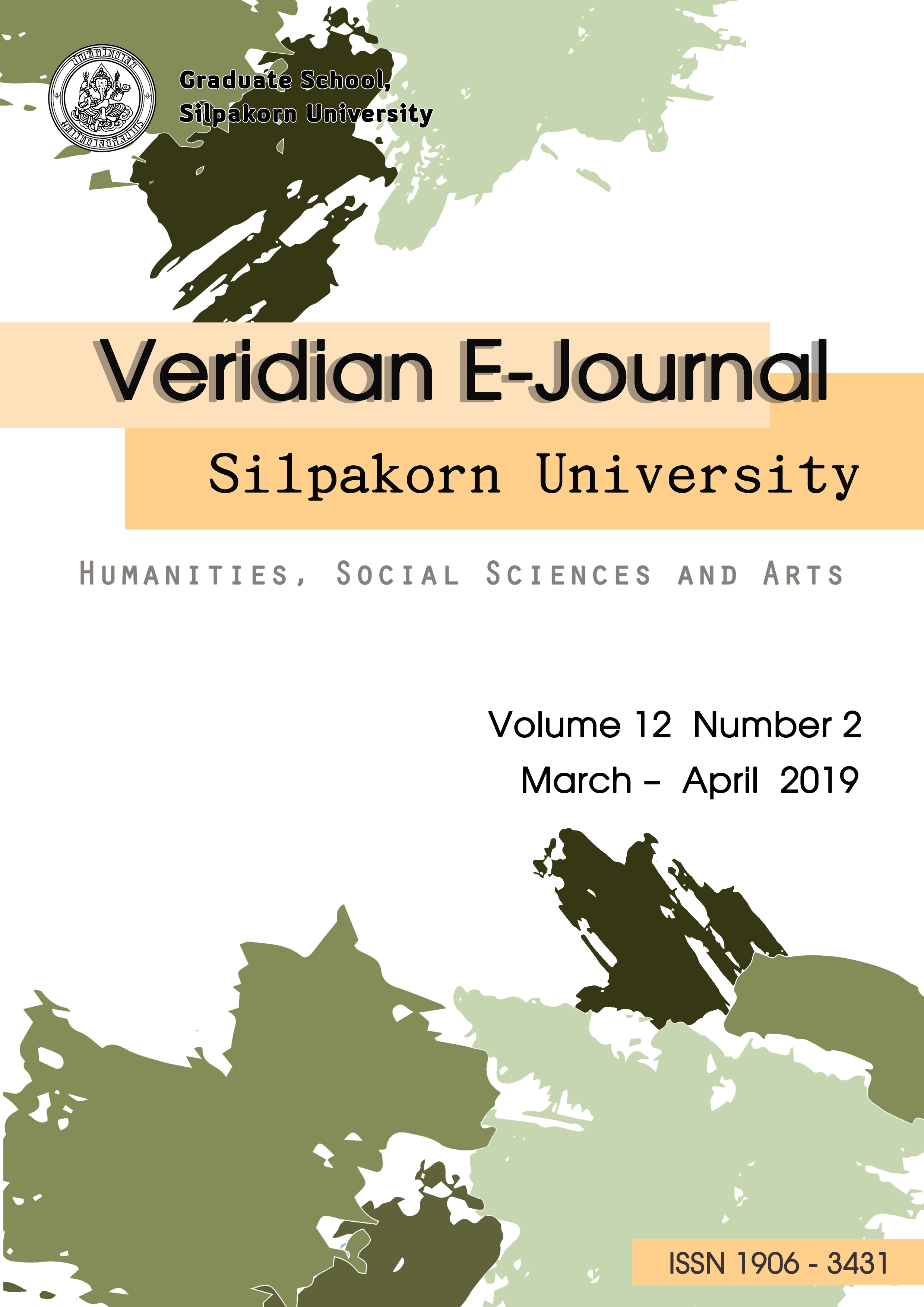การพัฒนากลยุทธ์การส่งเสริมการจัดการความรู้ภูมิปัญญาท้องถิ่นของวิสาหกิจชุมชน จังหวัดเชียงใหม่ (Strategic Development for Supportive the Knowledge Management for Local Wisdom of Community Enterprises Chiang Mai Province)
Main Article Content
บทคัดย่อ
งานวิจัยครั้งนี้มีวัตถุประสงค์เพื่อ 1) ศึกษาสภาพปัจจุบันของการจัดการความรู้ภูมิปัญญาท้องถิ่นของวิสาหกิจชุมชน จังหวัดเชียงใหม่ 2) พัฒนากลยุทธ์การส่งเสริมการจัดการความรู้ภูมิปัญญาท้องถิ่นของวิสาหกิจชุมชน จังหวัดเชียงใหม่ กลุ่มตัวอย่างที่ใช้ในการวิจัยครั้งนี้ คือ วิสาหิจชุมชนที่ได้รับผลการประเมินศักยภาพอยู่ในระดับปานกลาง จากสำนักงานเกษตรจังหวัดเชียงใหม่ประจำปี 2559 เลือกกลุ่มตัวอย่างแบบเจาะจง จำนวน 226 กลุ่ม เครื่องมือที่ใช้ในการวิจัยประกอบด้วยแบบสอบถาม แบบสัมภาษณ์เชิงลึก และแบบบันทึกการสนทนากลุ่ม สถิติที่ใช้ในการวิเคราะห์ข้อมูลประกอบด้วย ความถี่ ร้อยละ ค่าเฉลี่ย ส่วนเบี่ยงเบนมาตรฐาน และการวิเคราะห์เชิงเนื้อหา
ผลการวิจัย พบว่า 1) สภาพปัจจุบันของการจัดการความรู้ภูมิปัญญาท้องถิ่นของวิสาหกิจชุมชน จังหวัดเชียงใหม่ ประกอบด้วย 9 กระบวนการ ดังนี้ 1.1) ด้านการกำหนดความรู้ วิสาหกิจชุมชนส่วนใหญ่มีการกำหนดความรู้ภูมิปัญญาท้องถิ่นของวิสาหกิจชุมชนเองโดยใช้กระบวนการมีส่วนร่วมระหว่างสมาชิกภายในกลุ่ม 1.2) ด้านการแสวงหาและสืบค้นความรู้ วิสาหกิจชุมชนส่วนใหญ่มีการสาธิตกระบวนการผลิตผลิตภัณฑ์โดยใช้ ภูมิปัญญาท้องถิ่นภายในชุมชนจากปราชญ์หรือผู้รู้ในชุมชนให้กับสมาชิกของวิสาหกิจชุมชน 1.3) ด้านการสร้างความรู้ วิสาหกิจชุมชนส่วนใหญ่ มีการนำความรู้ของสมาชิกภายในกลุ่มมาประยุกต์ เข้ากับภูมิปัญญาดั้งเดิมของชุมชนหรือความรู้จากปราชญ์ / ผู้รู้ในชุมชน 1.4) ด้านการประมวลความรู้เป็นหมวดหมู่ วิสาหกิจชุมชนส่วนใหญ่ ไม่มีการใช้แบบบันทึก และเทคโนโลยีการสื่อสารต่างๆช่วยในการประมวลความรู้อย่างเป็นระบบ 1.5) ด้านการแลกเปลี่ยนความรู้ วิสาหกิจชุมชนส่วนใหญ่ ไม่มีการแลกเปลี่ยนความรู้อย่างเป็นทางการกับองค์กรที่ไม่แสวงผลกำไร 1.6) ด้านจัดเก็บความรู้ วิสาหกิจชุมชนส่วนใหญ่ไม่มีการจัดเก็บความรู้อย่างเป็นระบบ 1.7) ด้านการถ่ายถอดความรู้ วิสาหกิจชุมชนส่วนใหญ่ได้รับการสนับสนุนและส่งเสริมการถ่ายทอดความรู้จากหน่วยงานภาคเอกชน 1.8) ด้านการนำความรู้ไปประยุกต์ใช้ วิสาหกิจชุมชนส่วนใหญ่มีการนำผลการแลกเปลี่ยนความรู้ภูมิปัญญาท้องถิ่นระหว่างสมาชิกภายในกลุ่มมาประยุกต์ใช้ในการวางแผนการดำเนินงานของกลุ่มอยู่เสมอ 1.9) ด้านการติดตามและประเมินผลความรู้ วิสาหกิจชุมชนส่วนใหญ่ได้รับการติดตามและประเมินผลการจัดการความรู้ ภูมิปัญญาท้องถิ่นจากหน่วยงานภาครัฐ 2) กลยุทธ์การส่งเสริมการจัดการความรู้ภูมิปัญญาท้องถิ่นของวิสาหกิจชุมชน จังหวัดเชียงใหม่ ประกอบด้วยกระบวนการ 5 ขั้นตอน ดังนี้ ขั้นที่ 1 กำหนดเป้าหมาย ประเมินจุดแข็ง จุดอ่อน โอกาส และ อุปสรรค ขั้นที่ 2 เข้าใจ บริบท / รู้เค้า รู้เรา ขั้นที่ 3 ประมวลแนวคิดและอบรมจากวิสาหกิจชุมชนต้นแบบ ขั้นที่ 4 ร่วมกันอภิปราย / สร้างกรอบความเข้าใจการดำเนินงานที่ชัดเจนรอบด้าน และ ขั้นที่ 5 สรุป แก้ปัญหาตรงประเด็น/นำเสนอแนวทางพัฒนาที่ปฏิบัติได้จริง กล่าวได้ว่าขั้นตอนของกลยุทธ์การส่งเสริมการจัดการความรู้ภูมิปัญญาท้องถิ่นของวิสาหกิจชุมชน จังหวัดเชียงใหม่ สามารถนำไปปรับประยุกต์ใช้กับการดำเนินงานเพื่อเพิ่มประสิทธิผลของวิสาหกิจชุมชนได้ทุกประเภท ก่อให้เกิดการพัฒนารูปแบบการดำเนินงานที่มีประโยชน์ต่อวิสาหกิจชุมชนบนพื้นฐานของความพอเพียงและความยั่งยืน
The purpose of this research were to 1) study the current state of the knowledge management for local wisdom of Community Enterprises Chiang Mai Province and 2) develop strategic for supportive the knowledge management for local wisdom of Community Enterprises Chiang Mai Province. The samples in this research included that 226 groups of the community enterprises that have potential assessment results in moderate level from Chiang Mai Provincial Agricultural Extension office 2016 were purposively selected. The instrument used in the research was consisted of questionnaire, in-depth interviews and note-taking form for Focus Group.The statistics used in this study consisted of frequency, percentage, means, standard deviations and content analysis. The results were showed that 1) the current state of the knowledge management for local wisdom of Community Enterprises Chiang Mai Province consisted of 9 process 1.1) Knowledge Identification : it was found that most of the community enterprises managed Knowledge Identification by themselves, by Use of participation among members within the group. 1.2) Knowledge Acquisition and Capture : it was found that most of the community enterprises had Demonstration of the production process using local wisdom in the community by local philosopher for Member of Community Enterprise. 1.3) Knowledge Creation : it was found that most of the community enterprises the knowledge of members within the group has been applied with the traditional wisdom of the community or the knowledge of local philosopher. 1.4) Knowledge Codification : it was found that most of the community enterprises no recording is used and communication technologies help in the processing of knowledge. 1.5) Knowledge Sharing : it was found that most of the community enterprises no formal exchange of knowledge with non-profit organizations. 1.6) Knowledge Storage : it was found that most of the community enterprises no systematic knowledge storage. 1.7) Knowledge Transfer : it was found that most of the community enterprises Supported and promoted the transfer of knowledge from the private sector and Knowledge transfer was carried out using community group processes.1.8) Knowledge Utilization or Application : it was found that most of the community enterprises used the results of knowledge sharing among local members were applied for Group Operations Planning. 1.9) Evaluative Knowledge : it was found that most of the community enterprises follow up and evaluate knowledge management of local wisdom from the government agencies. 2) Strategies for Supportive knowledge management local wisdom of community enterprises Chiang Mai Province including 5 steps as follows Step 1 : Set goals / Assess strengths, weaknesses, opportunities and Threats. Step 2 : Know context / Know People Step 3 : Concepts and training of the prototype community enterprises Step 4 : Discussion / Frame Insights and Step 5 : Frame Solutions and Realize Offering. It cloud be said that the steps of strategies for Supportive the knowledge management of local wisdom of community enterprises Chiang Mai Province cloud be applied to the operations to increase the effectiveness of all types of community enterprises causing a form of useful operation to community enterprises based on sufficiency and sustainability.

